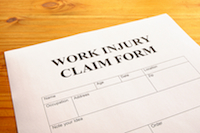 Employees who are injured on the job are entitled to specific benefits to compensate for the loss of wages and work hours. This system is called workers' compensation, which outlines procedures for obtaining the benefits and the laws that govern this process. Each state has individual workers' compensation laws that may vary. Additionally, special workers' compensation laws pertain to federal employees and those who work in specific industries. Although the laws may vary from state to state, each business is required to purchase workers' compensation insurance to cover employees who get injured. The process to file a workers' compensation claim is similar to filing a regular insurance claim; the claim is a request for benefits.
Employees who are injured on the job are entitled to specific benefits to compensate for the loss of wages and work hours. This system is called workers' compensation, which outlines procedures for obtaining the benefits and the laws that govern this process. Each state has individual workers' compensation laws that may vary. Additionally, special workers' compensation laws pertain to federal employees and those who work in specific industries. Although the laws may vary from state to state, each business is required to purchase workers' compensation insurance to cover employees who get injured. The process to file a workers' compensation claim is similar to filing a regular insurance claim; the claim is a request for benefits.
The Purpose of Workers' Compensation
Workers' compensation provides a fixed monetary award to employees who are injured on the job or as a result of performing certain job duties. In most cases, this eliminates the need to file a legal claim against an employer. Most laws also provide protection to employers and co-workers by placing limits on the amount an injured employee can recover. Workers' compensation does not seek to determine negligence, but rather to cover an employee for injuries related to his or her job.
Injuries Covered by Workers' Compensation
Eligibility for workers' compensation covers different types of work-related injuries. If job duties accelerate or aggravate a pre-existing condition, an employee may be entitled to workers' compensation. At-work injuries during breaks, lunch hours and company sponsored activities are covered. Exposure to harmful toxins at work which lead to cancer or other life-threatening diseases is also covered. The onset of mental and physical strain from work-related stress or an increase of work duties is considered a work-related injury. Some states include a disabling mental condition that is the result of job demands and constant harassment from a supervisor.
There are several things that an employee must do if he or she has been injured on-the-job. An employee should immediately report the injury in writing to the employer, keeping a copy for personal records. The employer should provide a claim form for the employee to complete. This form is used to notify the workers compensation insurance company that an injury has occurred.
Employer Responsibility for Workers' Compensation
Unless the company has fewer than four employees, purchasing workers' compensation is required in most states. Otherwise, employers are subject to civil liability, fines and criminal prosecution for not having workers' compensation insurance. Employers are also exposed to a lawsuit from the injured employee.
Most states also require employers to post a notice of compliance with the state's workers' compensation laws in a prominent area.
What else can I help you with?
What has the author Duncan S Ballantyne written?
Duncan S. Ballantyne has written: 'Workers' compensation in Iowa' -- subject(s): Workers' compensation, Statistics, Administration 'Accommodation of disabled visitors at historic sites in the national park system' -- subject(s): Barrier-free design, Historic buildings 'Workers' compensation in New Jersey' -- subject(s): New Jersey, New Jersey. Dept. of Labor. Division of Worker's Compensation, Workers' compensation 'Revisiting workers' compensation in Michigan' -- subject(s): Workers' compensation, Law and legislation 'Workers' compensation in Oregon' -- subject(s): Workers' compensation, Law and legislation, Workers' compensation claims 'Revisiting Workers' Compensation in Missouri' 'Workers' Compensation in Arkansas' 'Workers' Compensation in Louisiana' 'Revisiting workers' compensation in Connecticut' -- subject(s): Workers' compensation 'Workers' compensation in Ohio' -- subject(s): Ohio, Ohio. Bureau of Workers' Compensation, Statistics, Workers' compensation 'Workers' compensation in Wisconsin' -- subject(s): Workers' compensation
Who handles workers compensation claims for Lockheed Martin?
Workers Compensation Appeals Board is the one that handles workers compensation claims for Lockheed Martin.
Which company provides best workers compensation?
There is really no best company that provides workers compensation. The compensation varies by state and there are some states that have been known to have poor workers compensation such as California.
How do you spell workers compensation insurance?
The correct spelling of the form of insurance is Workers' Compensation.
Should workers' compensation have an apostrophe?
No, "workers' compensation" does include an apostrophe because it refers to compensation for workers. The apostrophe indicates that the compensation belongs to the workers, making it possessive. Without the apostrophe, it would imply a different meaning that does not accurately reflect the context.
How do you spell workers' comp?
workers' compensation
What are the workers compensation laws for hospitals?
Workers compensation laws differ from country to country. The laws for hospitals do not differ very much from the workers compensation laws for other businesses.
How is money awarded in a workers compensation lawsuit?
How is money awarded or decided in workers compensation cases?
When was Ohio Bureau of Workers' Compensation created?
Ohio Bureau of Workers' Compensation was created in 1912.
What has the author Stanford D Herlick written?
Stanford D. Herlick has written: 'California Workers' Compensation Handbook 2006 25th Edition' 'California Workers Compensation Handbook' 'The California workmen's compensation handbook' -- subject(s): Workers' compensation 'California Workers' Compensation Handbook, Fourteenth Edition'
How do you file your taxes if you are on workers compensation?
Workers compensation should send you a form that you will apply to your tax returns.
If someone is hurt on the job, he deserves workers' compensation.?
If someone is hurt on the job, he deserves workers' compensation.
